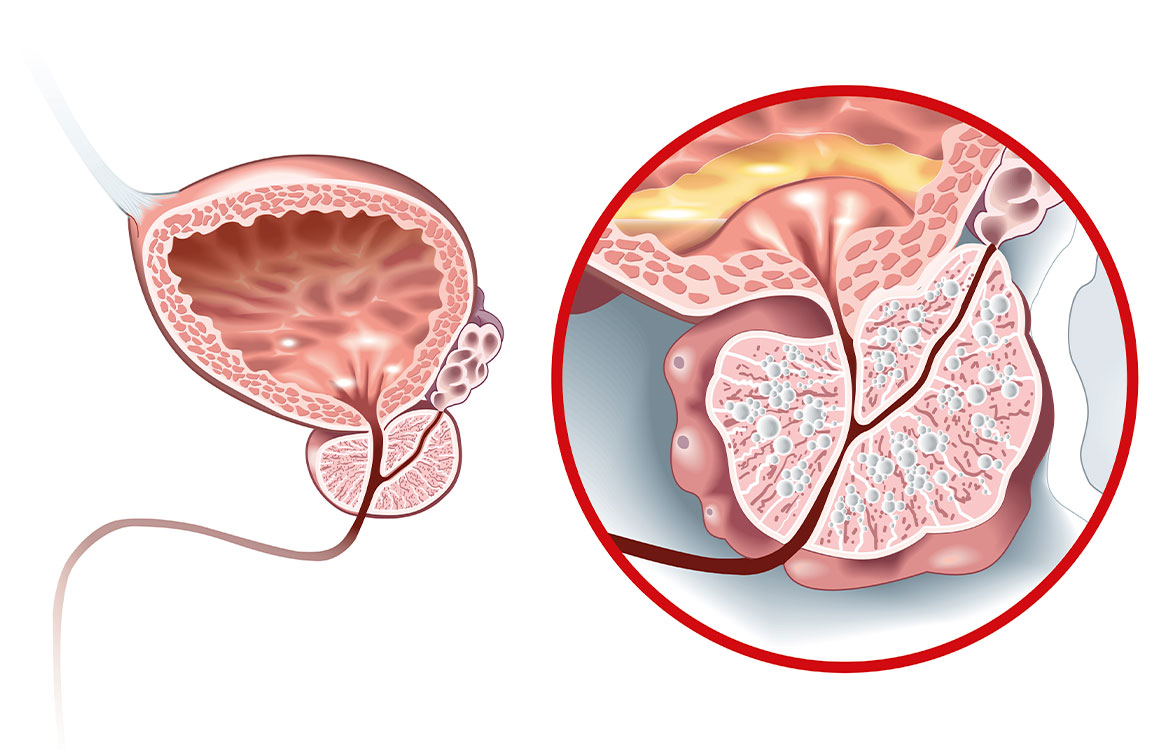Conditions
What is an Enlarged Prostate?
An enlarged prostate is technically known as benign prostatic hypertrophy (BPH). A non-cancerous condition, the excessive growth of prostate tissue pushes against the urethra and bladder, thereby blocking the flow of urine.
The prostate gland enlarges with age – it is estimated that around half of men above 50 years old have BPH. By 80 years old, it is estimated that around 80% of men will have it.

What are the Signs and Symptoms?
- Difficulty starting and stopping urination
- Weak urinary stream
- Interruption of the stream
- Sensation of incomplete emptying of the bladder
- Urgency and frequent urination
- Waking up multiple times at night to urinate
If BPH is suspected, your urologist will conduct tests (digital rectal exam, urine test, and Prostate Specific Antigen test) to confirm the diagnosis and embark on a targeted treatment plan.
Contact UsDo I Need to Get Treated for BPH?
Despite the benign nature of BPH and the seemingly mild to moderate day-to-day inconveniences (e.g. frequent urination), it is still important to get it treated as <span class="font-semibold">long-term urinary obstruction can lead to serious complications</span> such as: urinary tract infections, retention of urine, and even kidney failure.
BPH Treatments: An Overview
Depending on the individual’s condition, BPH can be treated via medications, minimally invasive procedures or urologic surgery.
Usually used to relax or shrink the prostate, but often comes with side effects and may need to be taken long-term.
Newer technologies like the Urolift simply lifts the prostate to relieve pressure on the urethra, while Rezum allows enlarged prostate tissue to shrink through the natural effects of steam and condensation. Prolieve uses heat energy and has been shown to provide good symptomatic relief.
The traditional and mainstay of treatment, the transurethral resection of the prostate (TURP) allows urologic surgeons to manually remove parts of the prostate; while the newer bipolar prostate vaporisation (Bipolar TURP) is less invasive as it vaporises excess prostate tissue.
Transurethral Resection of Prostate (TURP)
A scope is inserted through the urethra to arrive at the prostate, from which, the obstructing parts of the prostate will be manually removed, one piece at a time. This is done through the electrical wire loop attached to the scope that is used to cut tissue and seal blood vessels. The pieces of prostate tissue are then carried into the bladder via irrigating fluid, and naturally flushed out after the procedure.
Bipolar Prostate Vaporisation (Bipolar TURP)
Instead of the electrical wire loop used in traditional TURP, the Bipolar TURP is attached to a tiny tip that vaporises prostate tissues. While it is commonly touted to be a bloodless and near painless experience, patients should still realistically expect intermittent blood in the urine for up to two weeks and an overnight hospital stay.
UroLift®
The UroLift® is an FDA-approved method of treating BPH in a minimally invasive way. It is a one-time in-clinic procedure that offers rapid relief and recovery to suitable patients. Inserted through the urethra to access the enlarged prostate, the UroLift® uses tiny implants to permanently lift and hold the prostate tissue apart, thereby increasing the opening of the urethra and restoring optimal urine flow.
Rezum
Rezum water vapour therapy is another minimally invasive procedure used to treat BPH. During each treatment, water vapour (steam) is released into the targeted prostate tissue. Upon coming into contact with the tissue, the steam turns back into water, releasing its stored energy. This process destroys the excess prostate cells, eventually shrinking the prostate and re-opening the urethra. There is no risk of incontinence and patients are able to preserve sexual function.
Prolieve® ThermoDilatation Therapy
Providing good symptomatic relief, Prolieve® is a non-surgical treatment that works by simultaneously heating the prostate (to reduce the size of the tissues) and dilating the urethra, restoring normal urine flow.
Dr Michael Wong
Medical Director & Senior Consultant Urologist
FAMS (Urology),FICS (USA),FRCS (Edinburgh),M Med (Surgery),MBBS (Singapore)
With over 30 years of experience, Dr Michael Wong is a reputable urologist of international standing. He is particularly passionate about the detection, prevention and treatment of prostate conditions; and is skilled in minimally invasive procedures for better outcomes.
In 2025, he was elected President of the USA-based Endourological Society, the highest international leadership position in the field of urology. Over the years, Dr Wong has also remained actively involved in leadership roles across other renowned urological organisations around the world.
Award 2018
by:

Prostate problems are common and can be benign or malignant. With timely diagnosis and treatment, you can regain a healthy and comfortable lifestyle.
For further enquiries, please contact our specialist clinic today
Mount Elizabeth Medical Centre, Singapore 228510

